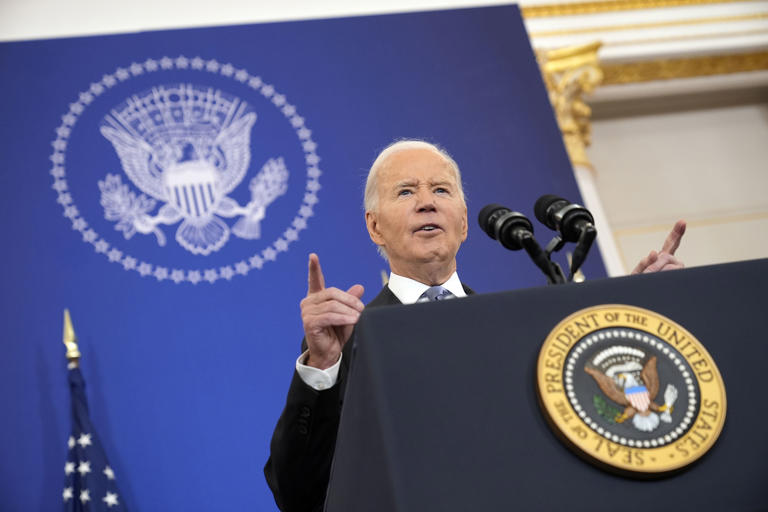“Biden Claims His Foreign Policy Gives Trump a Major Advantage!”
Speaking to both history and the civil servants gathered at the State Department on Monday, President Joe Biden reflected on his administration’s foreign policy, highlighting its role in strengthening the U.S. and its alliances. In what he framed as a legacy-defining moment, Biden delivered a nearly 30-minute address touching on global challenges he faced, from strained alliances to recent Israel-Hamas ceasefire negotiations. He emphasized the United States’ leadership in fostering global cooperation, contrasting it with the “America First” approach of his successor, Donald Trump, who will take office on January 20.
“My administration is leaving the next one with a very strong hand to play,” Biden said. “We’re handing over an America with stronger alliances, more friends, and weakened adversaries — an America back in the lead.”
Biden’s remarks, days before Trump’s inauguration, appeared designed to underscore his administration’s accomplishments amid the anticipated shifts in foreign policy under Trump. The president-elect has already sparked controversy with suggestions about expanding U.S. sovereignty to Canada, Greenland, and the Panama Canal. Biden’s comments served as a preemptive defense of his record against any potential upheaval in the upcoming administration.
This speech capped months of efforts by Biden to highlight his achievements, both domestically and internationally, in the wake of his party’s electoral defeat in November. It followed a December economic address aimed at shaping public and historical perceptions of his presidency.
While Biden has faced criticism for the chaotic 2021 withdrawal from Afghanistan and his firm support for Israel during its war in Gaza, he has earned praise for rebuilding coalitions against Russia and China. In his speech, Biden defended his diplomatic legacy, asserting that his administration’s efforts had advanced U.S. values and strategic goals.
On Wednesday, Biden is set to deliver a broader farewell address from the Oval Office, which will soon be occupied by a man he has deemed unfit for the presidency, marking the end of his 50-year career in public service.
President Joe Biden, reflecting on his decades of foreign policy experience, highlighted his administration’s efforts to strengthen U.S. alliances and global leadership. With over 50 years in public service, including chairing the Senate Foreign Relations Committee and shaping key policies as Vice President under Barack Obama, Biden has frequently emphasized his close ties with world leaders and his understanding of international challenges.
In his remarks, Biden pointed to accomplishments such as rallying NATO after Russia’s invasion of Ukraine and reaffirmed his commitment to global diplomacy. He recalled his 2023 visit to Kyiv during the ongoing war, showcasing U.S. solidarity with Ukraine. He also expressed optimism about an impending Israel-Hamas ceasefire, signaling significant progress in negotiations mediated by the U.S., Qatar, and Egypt.
On Afghanistan, Biden defended his decision to end the 20-year war, acknowledging the tragic losses during the withdrawal but standing firm on the necessity of bringing U.S. troops home. “Ending the war was the right thing to do, and I believe history will reflect that,” he said.
Amid his reflections, Biden addressed his decision to withdraw from the 2024 presidential race, prioritizing party unity over personal ambition. Despite stepping aside, he maintained confidence in his ability to win another term, citing his tenure as an honor.
Looking forward, Biden asserted the importance of continued U.S. leadership on the global stage, contrasting his vision with the more isolationist approach of his successor, Donald Trump. “If we’re not leading the world, who does?” he asked, underscoring his belief in America’s role as a champion of freedom and democracy.
As his presidency concludes, Biden and his supporters hope history will ultimately view his achievements more favorably, drawing parallels to leaders like Harry Truman and Jimmy Carter, whose legacies were re-evaluated positively over time.
Gerry Shih in Jerusalem contributed to this report.
